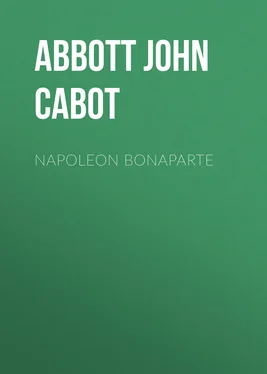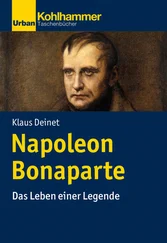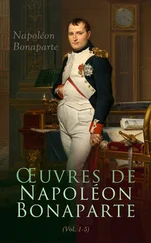John Abbott - Napoleon Bonaparte
Здесь есть возможность читать онлайн «John Abbott - Napoleon Bonaparte» — ознакомительный отрывок электронной книги совершенно бесплатно, а после прочтения отрывка купить полную версию. В некоторых случаях можно слушать аудио, скачать через торрент в формате fb2 и присутствует краткое содержание. Жанр: Биографии и Мемуары, История, foreign_edu, foreign_antique, foreign_prose, на английском языке. Описание произведения, (предисловие) а так же отзывы посетителей доступны на портале библиотеки ЛибКат.
- Название:Napoleon Bonaparte
- Автор:
- Жанр:
- Год:неизвестен
- ISBN:нет данных
- Рейтинг книги:5 / 5. Голосов: 1
-
Избранное:Добавить в избранное
- Отзывы:
-
Ваша оценка:
- 100
- 1
- 2
- 3
- 4
- 5
Napoleon Bonaparte: краткое содержание, описание и аннотация
Предлагаем к чтению аннотацию, описание, краткое содержание или предисловие (зависит от того, что написал сам автор книги «Napoleon Bonaparte»). Если вы не нашли необходимую информацию о книге — напишите в комментариях, мы постараемся отыскать её.
Napoleon Bonaparte — читать онлайн ознакомительный отрывок
Ниже представлен текст книги, разбитый по страницам. Система сохранения места последней прочитанной страницы, позволяет с удобством читать онлайн бесплатно книгу «Napoleon Bonaparte», без необходимости каждый раз заново искать на чём Вы остановились. Поставьте закладку, и сможете в любой момент перейти на страницу, на которой закончили чтение.
Интервал:
Закладка:
It was now September. Two months had passed in these vexations and sterile negotiations. Napoleon had taken every step in his power to secure peace. He sincerely desired it. He had already won all the laurels he could wish to win on the field of battle. The reconstruction of society in France, and the consolidation of his power, demanded all his energies. The consolidation of his power! That was just what the government of England dreaded. The consolidation of democratic power in France was dangerous to king and to noble. William Pits, the soul of the aristocratic government of England, determined still to prosecute the war. France could not harm England. But England, with her invincible fleet, could sweep the commerce of France from the seas. Fox and his coadjutors with great eloquence and energy opposed the war. Their efforts were, however, unavailing. The people of England, notwithstanding all the efforts of the government to defame the character of the First Consul, still cherished the conviction that, after all, Napoleon was their friend. Napoleon, in subsequent years, while reviewing these scenes of his early conflicts, with characteristic eloquence and magnanimity, gave utterance to the following sentiments which, it is as certain as destiny, that the verdict of the world will yet confirm.
"Pitt was the master of European policy. He held in his hands the moral fate of nations. But he made an ill use of his power. He kindled the fire of discord throughout the universe; and his name, like that of Erostratus, will be inscribed in history, amidst flames, lamentations, and tears. Twenty-five years of universal conflagration; the numerous coalitions that added fuel to the flame; the revolution and devastation of Europe; the bloodshed of nations; the frightful debt of England, by which all these horrors were maintained; the pestilential system of loans, by which the people of Europe are oppressed; the general discontent that now prevails—all must be attributed to Pitt. Posterity will brand him as a scourge. The man so lauded in his own time, will hereafter be regarded as the genius of evil. Not that I consider him to have been willfully atrocious, or doubt his having entertained the conviction that he was acting right. But St. Bartholomew had also its conscientious advocates. The Pope and cardinals celebrated it by a Te Deum ; and we have no reason to doubt their having done so in perfect sincerity. Such is the weakness of human reason and judgment! But that for which posterity will, above all, execrate the memory of Pitt, is the hateful school, which he has left behind him; its insolent Machiavelism, its profound immorality, its cold egotism, and its utter disregard of justice and human happiness. Whether it be the effect of admiration and gratitude, or the result of mere instinct and sympathy, Pitt is, and will continue to be, the idol of the European aristocracy. There was, indeed, a touch of the Sylla in his character. His system has kept the popular cause in check, and brought about the triumph of the patricians. As for Fox, one must not look for his model among the ancients. He is himself a model, and his principles will sooner or later rule the world. The death of Fox was one of the fatalities of my career. Had his life been prolonged, affairs would taken a totally different turn. The cause of the people would have triumphed, and we should have established a new order of things in Europe."
Austria really desired peace. The march of Napoleon's armies upon Vienna was an evil more to be dreaded than even the consolidation of Napoleon's power in France. But Austria was, by loans and treaties, so entangled with England, that she could make not peace without the consent of the Court of St. James. Napoleon found that he was but triffled with. Interminable difficulties were thrown in the way of negotiation. Austria was taking advantage of the cessation of hostilities, merely to recruit her defeated armies, that, soon as the approaching winter had passed away, she might fall, with renovated energies, upon France. The month of November had now arrived, and the mountains, whitened with snow, were swept by the bleak winds of winter. The period of the armistice had expired. Austria applied for its prolongation. Napoleon was no longer thus to be duped. He consented, however, to a continued suspension of hostilities, on condition that the treaty of peace were signed within forty-eight hours. Austria, believing that no sane man would march an army into Germany in the dead of winter, and that she should have abundant time to prepare for a spring campaign, refused. The armies of France were immediately on the move. The Emperor of Austria had improved every moment of this transient interval of peace, in recruiting his forces. In person he had visited the army to inspire his troops with enthusiasm. The command of the imperial forces was intrusted to his second brother, the Archduke John. Napoleon moved with his accustomed vigor. The political necessities of Paris and of France rendered it impossible for him to leave the metropolis. He ordered one powerful army, under General Brune, to attack the Austrians in Italy, on the banks of Mincio, and to press firmly toward Vienna. In the performance of this operation, General Macdonald, in the dead of winter, effected his heroic passage over the Alps by the pass of the Splugen. Victory followed their standards.
Moreau, with his magnificent army, commenced a winter campaign on the Rhine. Between the rivers Iser and Inn there is an enormous forest, many leagues in extent, of sombre firs and pines. It is a dreary and almost uninhabited wilderness, of wild ravines, and tangled under-brush. Two great roads have been cut through the forest, and sundry woodmen's paths penetrate it at different points. In the centre there is a little hamlet, of a few miserable huts, called Hohenlinden. In this forest, on the night of the 3d of December, 1800, Moreau, with sixty thousand men, encountered the Archduke John with seventy thousand Austrian troops. The clocks upon the towers of Munich had but just tolled the hour of midnight when both armies were in motion, each hoping to surprise the other. A dismal wintry storm was howling over the tree tops, and the smothering snow, falling rapidly, obliterated all traces of a path, and rendered it almost impossible to drag through the drifts the ponderous artillery. Both parties, in the dark and tempestuous night, became entangled in the forest, and the heads of their columns in various places met. An awful scene of confusion, conflict, and carnage then ensued. Imagination can not compass the terrible sublimity of that spectacle. The dark midnight, the howlings of the wintry storm, the driving sheets of snow, the incessant roar of artillery and of musketry from one hundred and thirty thousand combatants, the lightning flashes of the guns, the crash of the falling trees as the heavy cannon-balls swept through the forest, the floundering of innumerable horsemen bewildered in the pathless snow, the shout of onset, the shriek of death, and the burst of martial music from a thousand bands—all combined to present a scene of horror and of demoniac energy, which probably even this lost world never presented before. The darkness of the black forest was so intense, and the snow fell in flakes so thick and fast and blinding, that the combatants could with difficulty see each other. They often judged of the foe only by his position, and fired at the flashes gleaming through the gloom. At times, hostile divisions became intermingled in inextricable confusion, and hand to hand, bayonet crossing bayonet, and sword clashing against sword, they fought with the ferocity of demons; for though the officers of an army may be influenced by the most elevated sentiments of dignity and of honor, the mass of the common soldiers have ever been the most miserable, worthless, and degraded of mankind. As the advancing and retreating host wavered to and fro, the wounded, by thousands, were left on hill-sides and in dark ravines, with the drifting snow, crimsoned with blood, their only blanket; there in solitude and agony to moan and freeze and die. What death-scenes the eye of God must have witnessed that night, in the solitudes of that dark, tempest-tossed, and blood-stained forest! At last the morning dawned through the unbroken clouds, and the battle raged with renovated fury. Nearly twenty thousand mutilated bodies of the dead and wounded were left upon the field, with gory locks frozen to their icy pillows, and covered with mounds of snow. At last the French were victorious at every point. The Austrians, having lost twenty-five thousand men in killed, wounded, and prisoners, one hundred pieces of artillery, and an immense number of wagons, fled in dismay. This terrific conflict has been immortalized by the noble epic of Campbell, which is now familiar wherever the English language is known.
Читать дальшеИнтервал:
Закладка:
Похожие книги на «Napoleon Bonaparte»
Представляем Вашему вниманию похожие книги на «Napoleon Bonaparte» списком для выбора. Мы отобрали схожую по названию и смыслу литературу в надежде предоставить читателям больше вариантов отыскать новые, интересные, ещё непрочитанные произведения.
Обсуждение, отзывы о книге «Napoleon Bonaparte» и просто собственные мнения читателей. Оставьте ваши комментарии, напишите, что Вы думаете о произведении, его смысле или главных героях. Укажите что конкретно понравилось, а что нет, и почему Вы так считаете.












